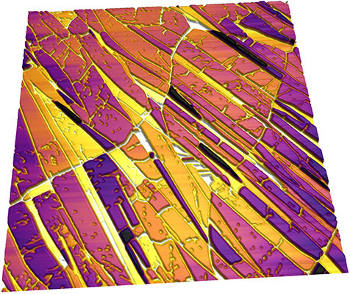Thin films are ubiquitous in materials science and technology, with uses ranging from exotic next generation materials (e.g. ferroelectric data storage) to practical everyday items (e.g. food wrappers).
 Topography image shown in 3D of crystalline domains in a non-planar phthalocyanine film grown on a highly ordered pyrolitic graphite substrate. Phthalocyanine is of interest for potential applications as an organic semiconductor, 25 µm scan. Luke Rochford, University of Warwick.
Topography image shown in 3D of crystalline domains in a non-planar phthalocyanine film grown on a highly ordered pyrolitic graphite substrate. Phthalocyanine is of interest for potential applications as an organic semiconductor, 25 µm scan. Luke Rochford, University of Warwick.
The intrinsic dimensions of thin films (thickness, grain and domain sizes, etc.) and the strong dependence of performance on film properties demand tools with nanoscale resolution. Atomic force microscopy (AFM) has long been used to measure thin film roughness and uniformity, and that remains one of the most common measurements made with AFM today.
As materials become more complex, AFMs are also being used to characterize the functionality of thin films, including their mechanical, electrical, electro-mechanical, and magnetic properties.
A new application note from Oxford Instruments Asylum Research titled “AFM Characterization of Thin Films: High Resolution Topography and Functional Properties” describes the many ways that Asylum Research AFMs are being used in this field and highlights several real-world examples where the AFM contributes directly actionable information that can help guide research and development of thin film materials.
“AFM measurements of thin films have become so common over the last twenty years that many people have begun to think of them as routine tasks within the capability of any old AFM,” said Dr. Ben Ohler, Director of Marketing at Oxford Instruments Asylum Research. “This mindset overlooks the reality that many thin films are shrinking in dimensions and growing more sophisticated in functionality. Film roughness can now be within the noise floor of first-generation AFMs. Film morphology is often inadequate to predict performance, which might depend more strongly on nanoelectrical or nanomechanical properties. Asylum Research AFMs offer higher performance and advanced imaging modes to provide more comprehensive information about these materials. Our AFMs today are also dramatically simpler to use and more productive than the AFMs you more commonly find in film deposition and etch facilities.”
To download the application note and get additional information, please visit:
www.oxford-instruments.com/thin-films
About Oxford Instruments Asylum Research
Oxford Instruments Asylum Research is the technology leader in atomic force microscopy for both materials and bioscience research. Asylum Research AFMs are used for a wide variety of nanoscience applications in material science, physics, polymers, chemistry, tribology, biomaterials, and bioscience, including emerging applications in energy storage and generation, low-dimensional materials,
and biophysics.
Asylum’s MFP-3D family of AFMs includes four different models that span a wide range of performance, applications, and budgets. The new MFP-3D Infinity is the flagship of the family, offering the highest performance, simplest operation, and widest range of capabilities. The MFP-3D Classic, the original MFP-3D offered for mid-range budgets, provides high performance and versatility that exceeds most AFMs. The MFP-3D Origin is the most affordable model, offering the same performance as the MFP-3D Classic with many accessories and an easy upgrade path to advanced capabilities. Finally, the MFP-3D-BIO integrates with an inverted light microscope to support biological and photonic applications.
Cypher is the highest resolution fast scanning AFM and is available in two configurations, the Cypher S and the Cypher ES Environmental AFM. They provide low-drift closed loop imaging for the most accurate images and measurements possible today, >20X faster imaging with small cantilevers, exceptional ease of use, and integrated thermal, acoustic and vibration control – all in a small footprint. Cypher AFMs routinely achieve higher resolution than other AFMs, as demonstrated by single point atomic defects in crystal lattices and imaging of the DNA double helix. The Cypher ES adds gas and liquid environmental control, temperature control, and enhanced chemical compatibility to the extraordinary performance of the
Cypher S.
In addition to the best AFMs, Asylum Research also offers unmatched customer support that is free for the lifetime of the AFM and industry-leading warranties for the lowest cost of ownership of any AFM. Asylum has sales, applications and service staff in offices in the United States, Germany, United Kingdom, Japan, France, China and Taiwan and global distribution.